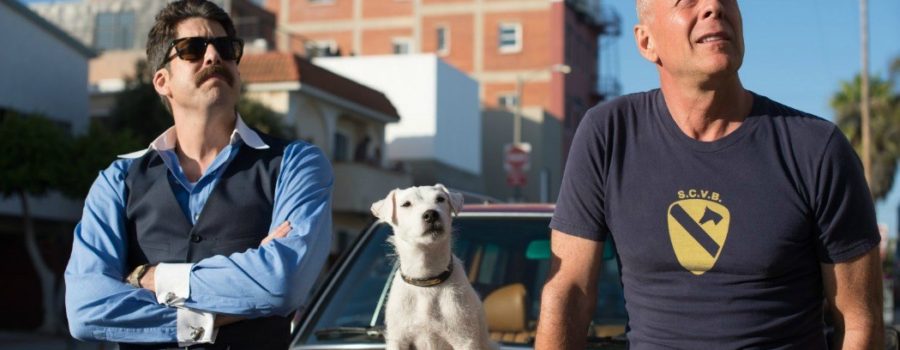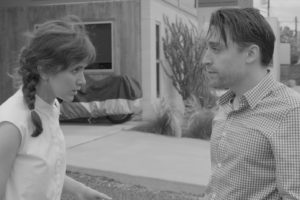[Published at Film Inquiry] Longevity isn’t easy for a traditional action star in the film industry. Actors grow older, bodies age, and, subsequently roles diminish. Fortunately for Bruce Willis, he is more than just brawn. He has proven himself to be more than adept as a dramatic actor (The Sixth Sense, Unbreakable, Moonrise Kingdom). However, over the past decade, he’s starred in several misfires, including the latest, Once Upon A Time In Venice. Writers Mark and Robb Cullen have crafted a Frankenstein’s monster, of sorts. The idea is there, but the execution falters.
Willis plays the only private detective of Venice Beach, California, Steve Ford. Washed up and down on his luck, his dog, Buddy is stolen by a local gang, prompting a comedy of errors that don’t add up to anything greater than half-hashed-out, individually crafted scenes. Even with an impressive supporting cast, including John Goodman, Jason Momoa, Thomas Middleditch, Adam Goldberg, Famke Janssen, David Arquette, and Kal Penn, Once Upon A Time In Venice’s narrative fails to come together to create something greater than the sum of its parts.
Narratively Confused
Middleditch’s narration sets up the story and the film’s main focus, Willis’s Steve. However, the material Middleditch is provided with is stale, and he doesn’t seem invested in the story enough, perhaps because his character isn’t fully fleshed out, or the story, for that matter; for instance, he occasionally breaks the fourth wall, but not in an interactive or fun way. His character isn’t even in a scene with Steve until almost 30 minutes into the film. His monotonous muttering eventually becomes off-putting.
Once Upon A Time In Venice doesn’t know exactly what it wants to be. Is it a character study, buddy comedy, noir thriller, crime satire, revenge romp, redemption story, gun violence parody, or love story?
Suffice it to say, the Cullen brothers packed a tad too much into the script for any subplot to take hold in the world that they create. The film is packed with genre references, from Easy Rider, to James Bond, Back To The Future, Forrest Gump, and even Zombeavers (why?), but too few of them are relevant to the plot. Jeff Cardoni’s music shifts from Hawaiin-infused slack-key guitar and traditional Hawaiian Nose Flute, breezy tunes to a variation of John Barry’s famous Bond theme song, to Mexican gangster music. It doesn’t help maintain a consistent tone throughout Once Upon A Time In Venice.

The first getaway scene is entertaining, but, after that, the action and chase scenes become redundant, and the villainous, minority gang archetypes border the line of offensive too often. Perhaps Once Upon A Time In Venice could have flowed a bit better from random scene to random scene if editors, Matthew Diezel and Zach Staenberg’s transitions weren’t as jolting; the plethora of freeze-frames don’t help, either.
Oddly enough, the Cullen brothers spend an inordinate amount of time introducing characters that have little relevance and/or impact on the plot. Understandably, they’re trying to make the audience believe that these archetypal characters are local legends, but adding random backstories and facts during Middleditch’s introduction, meant to be comical, only distract from the larger plot. In doing so, they do a lot of telling instead of showing, which is an easy cop-out.
Speaking of plot, for a film whose tagline is “Never Mess With A Man’s Dog,” it takes far too long to introduce the main plot point (35 minutes into the 94-minute film). Once Upon A Time In Venice’s subplots drag the story down with their seeming irrelevance and lack of adequate development.
Where’s The Dog?
In so many irrelevant diversions in the story in the first 35 minutes, there is only about thirty seconds of bonding established between Steve and his dog. I love dogs, don’t get me wrong, but Buddy is barely a character in the film, and one that needed more of a chance to bond with Steve to establish additional sympathy with the audience.

Furthermore, the dog isn’t even Steve’s, it’s his niece’s. It would make a lot more sense if it was his own dog; it would at least partially justify Steve’s 45-minute, anger-fueled quest to retrieve Buddy. The cliché line recited by Willis, “never fuck with a man’s dog,” doesn’t have the levity nor humor it should. Not to mention, there’s a scene involving violence committed against an innocent dog (which is never tasteful to portray), so it’s problematic, to say the least.
Throughout Once Upon A Time In Venice, its cast of characters describe the personality and characteristics of the dog, but we, as the audience, don’t get to see this, and eventually, on top of the redundant, distracting narration, we lose interest in Steve’s quest to retrieve Buddy. In fact, the dog becomes more of an unintended, benign subplot. When Steve is finally reunited with Buddy, it’s cut far too short for the viewer to experience any sense of satisfaction.
Solid But Underutilized Performances
Willis is delightfully loose and easy-going, playing against his stoic, tough-guy archetype. Every mannerism down to his slouched posture leaves an imprint of a disgraced but not quite defeated man, hopeful for redemption. Believe it or not, the audience doesn’t see a monotoned Willis, but rather one with vocal inflections and a touch of, dare I say, pizzazz.
Despite an unsuccessful attempt by the Cullen brothers to disrupt the distasteful, greedy Jewish stereotype, Goldberg provides his own clicks and quirks to his character. As a seasoned character actor, Goldberg adds way more to the role than was asked of him, but it helps add substance to an otherwise one-dimensional secondary character.

Middleditch and Willis’s characters, who are partners, don’t meet until one-third of the way into Once Upon A Time In Venice, which is a shame, because they have a solid onscreen chemistry. And so do Goodman and Willis, for that matter; the two veterans’ relaxed approach to their characters mesh well when they’re together.
It’s irritating to see a committed Arquette in such a small role within the story. Speaking of which, Penn’s presence is essentially a cameo as well. It begs the question, why cast such talented actors in wasteful roles unworthy of the skill they possess of their craft? Momoa’scharacter, the main “villain,” doesn’t translate well onto the screen. That being said, he shows his aptitude for comedic timing through his portrayal of a calm, smooth-talking, and deadpan criminal. However, the best secondary performance goes to Janssen. However, as the frazzled, overwrought, but tough sister of Steve, sadly, she gets only about five minutes of screen time.
Once Upon A Time In Venice: Laughs, But Few And Far Between
There are moments of genuine hilarity in Once Upon A Time In Venice, but, for the most part, the jokes fall flat. It is clearly a film made by cinephiles, but the pop culture references, scattered subplots, an unnecessary love triangle, and underdeveloped characters combine for an overall misfire. It’s a half-baked, So-Cal fairytale. Furthermore, the Cullen brothers’ attempts at poking fun at race relations and trivial but deadly gang violence are, for the most part, unnecessary and delivered in a crass manner. Once Upon A Time In Venice isn’t a comedy of errors, it’s a parody of errors. It’s as aimless as it is mundane.
The supporting cast, however good they are, don’t get nearly the screen time they should, and Middleditch’s stodgy narration takes up far too much of Once Upon A Time In Venice’s runtime. Fortunately, a casually charismatic Willis and Goodman get the most screen time, essentially holding the film back from being a complete waste of time. It’s not a horrible film, but rather, it’s something you watch when there’s nothing to do during a lazy Saturday night. Something that doesn’t require you to think at all.
Did you enjoy the lackadaisical narrative approach to Once Upon A Time In Venice? Which character was your favorite?
Own Once Upon A Time In Venice today on DVD, Blu-ray, or on digital streaming platforms!








Leave a Reply
Your email is safe with us.